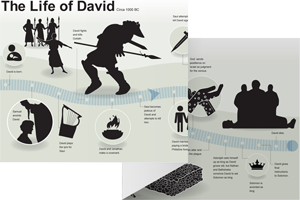14:1–17 The Chronicler uses material from 2 Sam 5:11–25 to interrupt the story of the ark being brought to Jerusalem (2 Sam 6). By rearranging the narrative, the Chronicler emphasizes that God blessed David even without the presence of the ark. This chapter describes David’s blessings in terms of friendship and provisions from a foreign nation (1 Chron 14:1–2), a fruitful lineage (vv. 3–7), and victory in battle (vv. 8–17). This provides further contrast between David and Saul, who was defeated in battle (10:1–13). |
14:1 Hiram, king of Tyre Assisted David and Solomon in their building projects (e.g., 1 Kgs 5:1–12).
14:2 had established him as king over Israel David views the gift from Hiram as evidence of God’s blessing and validation for his newly established monarchy.
14:3 David took more wives The Chronicler omits the reference to David’s concubines found in 2 Sam 5:13. This is most likely to avoid any confusion about the pedigree of David’s children listed here. The Chronicler does mention David’s concubines earlier (1 Chron 3:9). See note on 2 Sam 5:13.
14:5–6 Neither Elpelet or Nogah are in the list from 2 Sam 5:14–16. It is possible they are omitted there because they died young. |
14:8 the Philistines See note on 1 Sam 4:1.
went out from before them The account in Samuel says David “went down to the stronghold.” See 2 Sam 5:17 and note.
 Battles of Saul and David Table
Battles of Saul and David Table
14:10 David inquired of God David’s inquiring of God portrays him in contrast to Saul, who inquired of a medium (1 Chron 10:13).
I will put them into your hand Further evidence of God’s blessing on David’s reign (see note on v. 2).
14:11 Baal-Perazim Means “Lord of bursting forth.”
has burst out against my enemies The Hebrew word parats earlier was used to describe God “breaking out” against Uzzah for touching the ark (see 13:11). Here God “breaks out” (parats) against the Philistines.
14:12 and they were burnt In 2 Samuel, David and his men carry the idols away, apparently as booty (2 Sam 5:21). The Chronicler portrays David as being faithful to the command to destroy foreign gods (Deut 7:5).
14:15 the sound of marching Indicates the presence of the heavenly hosts, with Yahweh as their commander (see note on 2 Sam 5:10).
14:16 from Gibeon to Gezer A span of about 20 miles.
14:17 the fame of David The Hebrew phrase used here, shem-dawid, literally refers to “the name of David”; it evokes the ancient Near Eastern idea that someone’s reputation (and ability) is represented by their name. The writers of Psalms often appeal to God’s name when seeking His help (Pss 25:11; 31:3).
Yahweh put God’s blessing gives David respect throughout the nations.

|
About Faithlife Study BibleFaithlife Study Bible (FSB) is your guide to the ancient world of the Old and New Testaments, with study notes and articles that draw from a wide range of academic research. FSB helps you learn how to think about interpretation methods and issues so that you can gain a deeper understanding of the text. |
| Copyright |
Copyright 2012 Logos Bible Software. |
| Support Info | fsb |
 Loading…
Loading…

